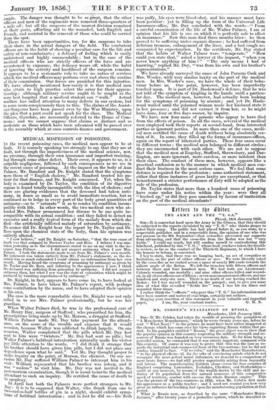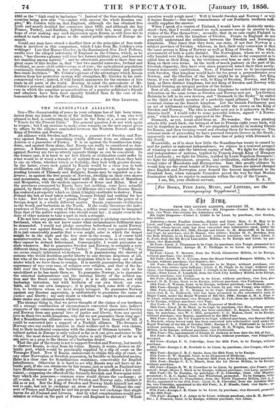MR. COBDEN'S EXALTATION OP RITSSIA.
Manchester, 15th January 1856. Saa—lf Mr. Cobden had taken the trouble of perusing the pamphlets of "A Manchester Manufacturer," which he wrote twenty years ago, before he sent " What Next ? " to the printer, he must have been rather staggered at the change which has come over his views regarding Russia within that pe- riod. In his pamphlet entitled " Russia," the great object was to show that the popular opinion in this country respecting the military strength and re- sources of Russia was founded on very erroneous data. be far from being a powerful nation, he contended that it was utterly impotent, compared with this country. Of course it was easy to prove that this was the case as re- gards the industrial and commercial force of the two nations ; but he did not confine himself to that. " If we refer " said the Manchester Manufacturer, " to the physical effects—if, for the sake of convincing minds which do not recognize the more potent moral influences, we descend to a comparison of mere brute forces—we find still greater superiority arising from ingenuity and labour. The manufacturing districts alone—even the four counties of England comprising Lancashire, Yorkshire, Cheshire and Staffordshire— could at any moment, by means of the wealth drawn 'by the skill and in- dustry of its population from the natural resources of this comparative speck of territory, combat with success the whole Russian empire." This was the picture a the two countries in 1836, when Mr. Cobden first made his appearance as a public teacher ; and I need not remind you how very great an influence his teaching had upon the manfacturing population at that period.
What is Russia now, as described by the same "Manchester Manu- facturer," after twenty years of a protective system, which he described in
1835 as the " high road to barbarism "? Instead of the four manufacturing emmties being now able "to combat with success the whole Russian em- pire," -Mr. Cobden tells us, that England, although she has obtained free trade and nearly doubled her commerce since 18&5, and although she has France, Turkey, and Sardinia, fighting along with her, must give up all hope of ever making any such impression upon Russia as will force her to mbmit to such terms of peace as the united public opinion of Europe de- mands.
Could any man have struck a deadlier blow at the principles of free trade than is involved in this comparison, which I take from Mr. Cobden's own 'writings? I see that Horace Greeley, in the Russianized New York Tribune, exults over the alleged inferiority of England in the Crimea, which, as he says, " has throwna gloomy veil over her former military glory, and lessened her standing among nations " : and he afterwards proceeds to show that one great cause of this decline is, that " her two martial nurseries, Ireland and "Scotland, no more yield soldier-crops as of yore ; the agricultural population continually diminishing in her realms under her centralizing and pseudo free-trade doctrines." Mr. Cobden's picture of the advantages which Russia derives from her protective system will strengthen Mr. Greeley in his anti- commercial views ; indeed, it will furnish arguments for the enemies of free trade in all parts of the world. Bearing in mind the antecedents of Mr. Cobden's personal and political career, I think it would be difficult to find a wise in which the sanguine prognostications of a popular politician's friends and admirers have been more signally falsified than m the case of the honourable Member for the West Riding.
AN OLD LEAGUER.































 Previous page
Previous page